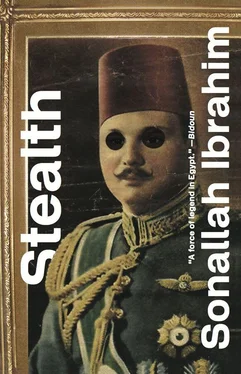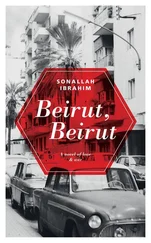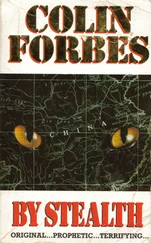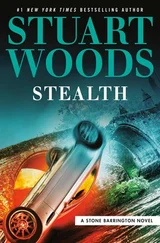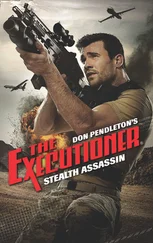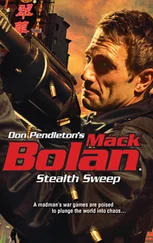He pulls off a blanket from on top of the bed. He crawls underneath it. He pushes away the old suitcase and spreads the blanket out over the floor. I do as he does. He gets down on his knees, leaning forward so his head does not hit the box springs. I huddle next to him. He wraps his arm around me.
I crawl to the edge of the bed near the door to the balcony. I stick my head out and look up at the piece of the sky that I can see. One of the stars fades away quickly. The ground defense searchlights gather together and try to catch it. Father whispers: “Where did you go? Come back here.” I go back next to him. We wait in the quiet. A ringing sound draws near. It gets closer and grows loud. Suddenly, it stops. I hear the sound of an explosion. The alarm siren comes on and off. My father switches off the light. Mother refuses to go to the storage closet. He begs her. She shouts back at him: “Is the closet going to protect us? Wake up, man. God is the Protector.” We sit in the living room. He takes me in his arms. The sound of cannons goes off every few minutes. A faint and familiar whistle. It gets closer and louder. It stops. A German bomb lands in front of the building. The glass in the window to the skylight shakes. The sideboard rocks forward. The mirror mounted on top of it falls off. After a while, the all-clear siren goes off. My father gets up to turn on the light while he mutters thanks and praise to God. Mother’s face is so white it’s scary.
I grab hold of father. He hugs me. He crawls out from under the bed and I follow him. We leave the room and go to the hall. We head towards the bathroom. He goes into the toilet. Water runs out of the tap in a strained trickle. He gathers up his gallabiya and leans forward. He presses the tap shut, and takes out a box of matches from his pocket. Strikes a match. The round circle of the toilet appears in the light. He raises the match up and climbs up on the stone base. I hang on to his gallabiya. He stretches out his hand and pulls me to him. I look away towards the wall. I close my eyes. I try to ignore the rotten smell of the toilet. I bury my face in his gallabiya. I listen to the sound of his breathing. My ear rubs against a piece of metal in his hernia belt. The sounds of explosions go on. He shivers. He shouts out: “O Gentle One, be gentle.”
I see after a while that the explosions have stopped. He loosens his grip on my shoulder. Silence starts to settle in. Then a long all-clear siren goes off. His panting settles down. We go out to the hallway. He turns on the light in the living room. We go back into our room. He turns on the light. He lights a black cigarette. We forget about the food and stand on the balcony. The children of the neighborhood come out carrying Ramadan lamps. Sameer carries a lamp with oval-shaped sides. Each side is a different color. Someone else has a lamp shaped like a football. I come back into the room and grab my lamp from on top of the desk. Its side panels are square. I open the main one and light the wick. I close it and it comes back open. I close it harder. I carry it very gently from the ring of tin at its top so I don’t get poked by the sharp edges of its base. I go out on to the balcony.
I watch the children as they chant: “Halloo, ya halloo! Ramadan has come, ya halloo !” In the middle of their chants, I can hear Samir’s delicate voice cutting through the others singing: “ Wahawee, ya wahawee! eeyooha! ” They’re coming out from deep inside the alley. They make it to underneath our balcony and one of them calls out: “O you fast-breaker! O you duty shaker!” Does he mean us? They pass on, further down the alley.
He prays the evening prayer. We put on our clothes to go out. He wraps his brown shoes, with the white tips, in a newspaper. He also rolls up the piece of brown cloth that we bought from the constable. We leave the house. We go out all the way to the street, passing in front of the sheikh of the quarter’s shop. There’s no one inside except Saleem, who stands behind the counter. We stop at the shoe repair shop. He hands over the shoes. The shoe repairman turns them in his hand and says: “The sole’s worn out. At the front and the back.”
Father says: “Put a piece of metal at the front and make it into a half sole.”
“Listen to my advice. Make a whole new sole. This is English. You don’t want to give it up.”
“Like I said, metal and a half sole.”
“Okay. Do you know how much new shoes are running these days, Bey? There’s a new American brand at Nasif for 68 piastres.”
“But it won’t last more than a couple of wearings. . American.”
He turns towards me saying: “Have you bought your shoes for the feast?”
Father answers before I can: “We’re waiting for the big feast, Inshallah. ”
He heads for the wooden newspaper rack. He unfolds today’s paper and reads through the headlines. I press my head between his stomach and the newspaper. The king in his dark glasses during a visit to the military hospital comforts the wounded returning from the front. The king of Transjordan is with him. Behind them are the two princesses, Fawziya and Faiza, in military clothes. Fawziya is a three-star general and Faiza a one-star. The shoe repairman says that we’ve become involved in a war that’s none of our business.
We keep walking to the square and then turn right and go down Qamr Street. We stop at the tailor’s shop. He sits in front of the shop on a chair with his legs stretched over another one. He’s working on repairing a jacket. Father gives him the cloth and says: “We want to make a suit for Eid out of it.” He studies the cloth, then says: “But Khalil Bey, this cloth is for curtains.”
“For curtains or not for curtains, I’m asking if you can do it.
The tailor nods his head, but he is not happy. He takes my measurements. Short trousers down to the knee. We agree that we will come back in a week to make the first patterns. We leave him and keep walking until we make it to Sakakeeny Square. We pass by the church. We go through Tourseena Street until it dead ends into al-Nuzha. Father stops in front of the villa of his friend, General Fareed. He pushes on the iron gate and I follow him up a path that cuts through a well-kept front yard. As we go up the few steps, he scrapes his shoes against the marble to announce that he is there. He knocks on an iron door. An old maid opens the door for us. He asks: “Is the bey here?” She invites him to come in.
We stop in an entrance hall crowded with furniture over a thick rug. She disappears then comes back. “Please come in, Bey.” We follow her to the guest room. Pictures of military officers, like the ones in our house, hang on the walls. A huge chandelier hangs from the ceiling. The general shows up after a while. He is wearing a robe made from colored silk and he is leaning on a cane. “Welcome, Khalil Bey. What a nice surprise!” He sits next to us and rests his cane between his legs. His face is dark and he has a sunken spot right under his neck. I know that it is from being shot. He’s wearing a white shirt under his robe with a stiff collar that the dead skin in his neck hangs over. His moustache is huge with big, woolly halves hanging down. He calls to the maid and asks her to bring the dishes of Ramadan fruit from the refrigerator. She brings three dishes on a round tray. Father gives me a dish and takes one for himself. He seems pleased with the cool dish. Mother lines up the small dishes of Ramadan fruit on the marble on top of the sideboard. She breaks up the ice into pieces with a wooden adze. She sprinkles it over the dishes.
They chat about the air raid. Father says that we were wrong to accept the truce. The general says that we had to accept it because our recent losses had been so awful. An example was the siege of Faluja. The Jewish forces kept our troops from getting water to the point that they ended up drinking their own piss. He mocked the talk between the defense minister, Haydar Pasha, and one of the other ministers that had been reported in the papers. The minister was supposed to have said to him: “Go for it, pasha. Let’s spend our Eid in Tel Aviv.” The general commented: “Yeah, right. I’ll be sure to meet you there.”
Читать дальше
